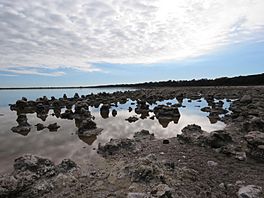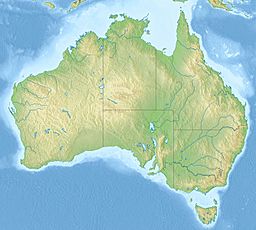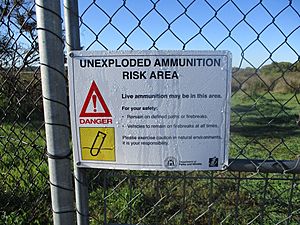Lake Walyungup facts for kids
Quick facts for kids Lake Walyungup |
|
|---|---|

Fossil Thrombolites at Lake Walyungup
|
|
| Location | Rockingham, Western Australia |
| Coordinates | 32°20′26″S 115°46′45″E / 32.34056°S 115.77917°E |
| Type | Saline |
| Basin countries | Australia |
| Designation | Rockingham Lakes Regional Park |
| Surface area | 430 ha (1,100 acres) |
| Average depth | 3.5 m (11 ft) |
Lake Walyungup is a shallow salt lake located in the suburbs of Warnbro and Port Kennedy. It is about 55 kilometres (34 mi) south of Perth, the capital city of Western Australia. This special lake is part of the Rockingham Lakes Regional Park. In the local Nyungar language, the name Walyungup means "place where Noongars talk."
Contents
About Lake Walyungup
Lake Walyungup is a popular spot for land sailors. This means people use special wheeled vehicles with sails to glide across the dry lakebed when the water level is low. The lake is surrounded by roads and a railway line. To the north, you'll find Safety Bay Road. To the east is Mandurah Road, and to the west is the Mandurah railway line. The Warnbro railway station is near the lake's north-western corner. Just north of Safety Bay Road is another lake called Lake Cooloongup.
How the Lake Formed
Lake Walyungup sits on an ancient beach ridge. It was once connected to the ocean! The lake formed a very long time ago, about 6,000 to 7,000 years ago. Inside the lake, scientists have found amazing structures called stromatolites or thrombolites. These are like living rocks made by tiny microbes. They are very old and show how life has changed over thousands of years.
Water Levels and Saltiness
Like its neighbor, Lake Cooloongup, Lake Walyungup is slowly drying out. This is because there has been less rain. The water depth in the lake can change a lot, from as little as 0.5 meters to 3.5 meters. The deepest parts of Lake Walyungup are where water stays all year round.
Both lakes are also becoming saltier. Lake Walyungup is even saltier than Lake Cooloongup. Unlike Lake Cooloongup, which has underground water flowing out to the sea, Lake Walyungup is a "closed system." This means water only leaves the lake through evapotranspiration. This is when water turns into vapor and goes into the air from the lake's surface or from plants.
Both lakes have small freshwater wetlands on their western side, which are made of sand dunes. The eastern side of the lakes is formed by a limestone ridge.
Cultural Importance
Lake Cooloongup and Lake Walyungup are very important to the local Indigenous people. They believe these lakes are where the Sea Waugal (a mythical serpent-like creature) laid her eggs. In the Nyungar language, Cooloongup means "place of children." This suggests that the northern lake (Cooloongup) was a place for children, while the southern lake (Walyungup) was for adults.
A study in 2005 showed that most visitors to Lake Walyungup are people who live nearby. Over 80 percent of visitors come from the local area.
Safety Information
Lake Walyungup, along with Lake Cooloongup, Port Kennedy Scientific Park, and Lark Hill (all part of Rockingham Lakes Regional Park), were once used as an artillery range by the Department of Defence around the time of World War II. Because of this, there might be old, unexploded items from that time. Warning signs are in place to keep visitors safe.
Plants and Animals
Lake Walyungup is surrounded by beautiful Tuart forests. You can also find a canopy of Swamp banksia trees.
Inside the lake's water, several types of fish have been seen. These include the Bluespot goby, the Long-headed goby, and the Western hardyhead.
 | Percy Lavon Julian |
 | Katherine Johnson |
 | George Washington Carver |
 | Annie Easley |



